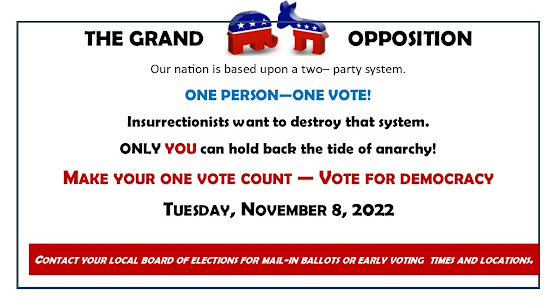By: Mildred Robertson
Well, it’s decision time folks. The end to early
voting for the 2022 Midterms is fast approaching and the November 8th
election looms large. There are weighty decisions that Americans must make this
November, and every one of us will be making one whether we choose to make our
way to the voting booth, or we tap out and say that our vote won’t make a
difference.
For those who choose the latter, nothing could be
further from the truth. You see, all that happens when you don’t participate in
the democratic process is that you strengthen the position of the person least
likely to represent your interests.
So not voting is actually a vote of sorts.
You see, someone will be making a decision about
whether women have autonomy over their bodies. Someone will decide whether working
Americans should have a living wage. Your elected representative will help
determine whether a 15-year-old can have access to an automatic rifle, or
whether it is all right to attack elected representatives if you don’t like how
they legislate. Someone will decide how
police officers will treat citizens under arrest, or in distress.
Whichever party wins in November will decide
whether you or your parents receive social security and how much. Elected
congressmen and women will determine whether we pursue clean energy, or whether
we aid Ukraine in its battle against tyranny. Local elected officials will
determine what children are allowed to learn in our school system, and they
will decide how much to invest to ensure all children get a sound basic
education. They will even determine where parks and housing developments are
built, how roads and infrastructure will be maintained, and whether there will
be affordable housing in your city.
Don’t you want to have some say in who is making
these vital decisions that directly impact your life?
There is no perfect candidate. Every one of them has some kind of flaw because each of them is human. You are not going to agree with every stance a politician may take. You may even feel that all the possible candidates are inadequate. But one of those candidates on the slate will have sway over your life for the next several years, and the decisions they make may possibly influence the next several decades. Do you want to leave the decision about who holds the power to others? Or do you want to have a voice in who runs your community? Because someone will.
Make your voice heard. VOTE IN THE NOVEMBER MIDTERM
ELECTION!
(You can register and vote during One-Stop Early voting, which
ends November 5 at 3 p.m. in Wake County North Carolina. Election Day is November 8th. Go to your local Board of Elections website
to determine dates, times, and locations for early and election-day voting in
the state and county where you live.)


